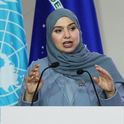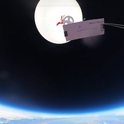Considering how vulnerable the Maldives is to climate change, could you tell us of your views on the outcome of COP26 and what happens next for the Maldives?
The Maldives welcomes the Glasgow Climate Pact and the crucial thing is that 1.5C is kept alive. However, we believe that more needs to be done and done urgently. The progress at COP26 is incremental but, it is not in line with the scale of what needs to be done. For us climate change is an existential threat.
Irrespective of what is happening outside of Maldives, internally we are focusing on formulating a strategic roadmap and plans to mobilize the financing of our net-zero pathway. The Maldives recently hosted an Energy Investor Conference, in partnership with the World Bank, which was attended by potential investors from all over the world. The aim of this was to help further our work towards net-zero targets and advance investments in renewable energy technologies. Similarly, in June 2021 the Green Climate Fund Board approved a USD 25.1 million grant to undertake a project on Building Climate Resilient Safer Islands in the Maldives, implemented in partnership with Japan International Cooperation Agency. The project’s focus is on reducing Maldivian vulnerability to coastal disaster risk and land loss due to an increase in coastal erosion.
Our second focus involves the process of strengthening policies and regulatory frameworks to realize our ambitious targets. Meeting these targets is of the utmost importance as the safety and security of our people depend on the successful tackling of global warming and stopping sea levels from rising any further. A key way this is occurring is through the establishment of a Climate Emergency Act (Act No: 9/2021) that was recently ratified by the President (18 May 2021) which introduces the legal structure and guidelines for addressing issues and concerns related to climate change. Another way the Maldives is strengthening our policies is through the pledge of designating at least one reef, one mangrove and one uninhabited island in each of the twenty atolls of Maldives as protected areas. This will protect and further the sustainable management of our natural assets. Additionally, we are designating entire atolls as UNESCO biosphere reserves, to model an effective and sustainable management system for atoll ecosystem conservation and sustainable development. Conservation funds are also established as part of this. Furthermore, by capitalising on our high levels of tourism the Tourist Green Tax is reserved for the Maldives Green Fund and exclusively used to fund and support sustainable development initiatives.
How has COVID-19 impacted the Maldives?
At the start of the pandemic, when COVID-19 case numbers began to rise around the world, the Maldives made the difficult decision to close our borders. As our economy relies heavily on tourism, this meant that we shifted from being a middle-income country to an almost zero-income country overnight: this standstill continued from March through to July last year and
resulted in an economic contraction of 32% in 2020. The impact of the pandemic on the Maldives serves truly to highlight the economic vulnerability of Small Island Developing states, especially those whose economies are reliant on a limited number of industries, such as tourism.
However, the Maldives also possesses several geographic advantages which made us well-equipped to deal with the spread of COVID-19. As an island nation, our population is widely dispersed, meaning we have few highly populated areas in which COVID-19 hotspots can form. Due to the self-contained nature of our island resorts, as a country we could even be described as ‘naturally socially-distanced.’
Additionally, over the past 18 months, the Maldives’ health sector capacity has been much enhanced in terms of testing and treatment. This has allowed us to mitigate the impact of the wave of COVID-19 cases our country experienced earlier this year. We have also met with great success in our efforts to vaccinate the Maldivian population, the small number being an advantage. 78.53% of our over-18s have been fully vaccinated, and our vaccination drive for children between the ages of 12-17 are currently making rapid progress.
Many great things are said about the Maldives fisheries sector, what is particularly prominent about it in your view and how engrained are sustainability practices in the Maldives?
I’m proud to say that the Maldives is home to the world’s most sustainable tuna fisheries, as we have preserved centuries-old traditional fishing methods, such as pole-and-line fishing and handline fishing. Our sustainable fishing techniques ensure that no harm is done to the marine fauna and flora. Each tuna is caught one by one. This is a technique handed down from father to son for over hundreds of years.
Maldivians truly constitute a fishing community at heart, and in most islands, fishing sustains entire populations, where each fisherman receives an equal share of the total catch of the day. We were also the first Indian Ocean tuna fishery to receive the Marine Stewardship Council (MSC) certification, which points to our high marine and ecological standards. We also have extensive domestic regulation to protect our marine ecosystem, prohibiting any form of net fishing commercially, purse seining, trawl net fishing and the use of explosives. Although we are a small country, we do not lease our Exclusive Economic Zone (EEZ) to foreign fishing vessels. We also offer all secondary students in the Maldives, a subject called Marine Science which teaches them all about our marine environment emphasising on its preservation. The Maldives is also a Co-Champion along with Kiribati of the Commonwealth Blue Charter Action Group on Sustainable Coastal Fisheries.
What are your immediate challenges with regards to fishing?
Despite the highly sustainable nature of the Maldivian fisheries sector, we are currently the only Commonwealth SIDS on which the UK imposes a 20% tariff on tuna products.
We have been having many meetings with various members of the UK government, House of Commons and House of Lords, NGOs working on sustainability and other stakeholders to change that. Everyone who I have spoken to has called it “an anomaly” but then there is little incentive to take it further, often justified as resulting from a lack of resources or that they are currently occupied with several larger trading nations. We understand this but simultaneously we believe that countries who are doing the right thing and using sustainable methods should be rewarded, not penalised. A drop in the UK’s tariff would directly benefit Maldivian fishermen and have a valuable impact on the economy.
I truly hope that the constant and irreproachable sustainability standards used in the Maldives for generations encourages the UK to reconsider its tariff policy with the Maldives by signing an Economic Partnership Agreement and rewarding sustainable fishing methods. We are not looking for a complicated trade agreement. We just wish to be treated in the same way as other Commonwealth SIDS, considering our strong commitment to sustainability.












